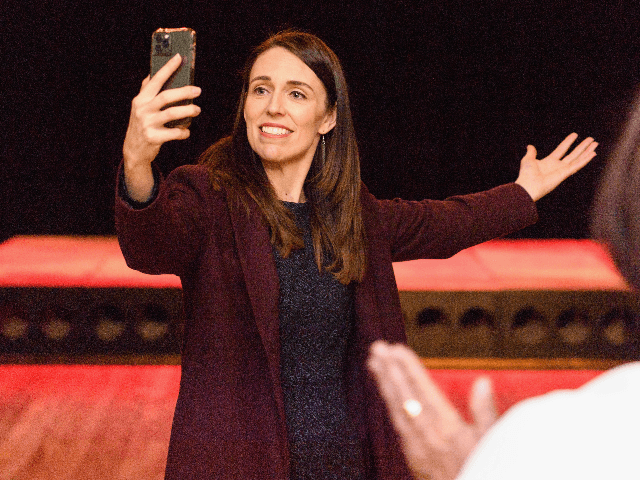New Zealand and global media are convinced New Zealand Prime Minister Jacinda Ardern will romp to re-election this weekend, based on public approval for her response to the Wuhan coronavirus.
Ardern was applauded for delaying the election in August due to a spike in coronavirus cases, a move denounced as an unspeakable assault on democracy when floated by U.S. President Donald Trump a few weeks earlier, even though the press considers the coronavirus a vastly more serious problem in the United States and normally welcomes dramatic measures to mitigate the overwhelming threat.
Ardern can do no wrong in the media’s eyes when it comes to the pandemic. Australia’s ABC News on Wednesday called her a “global superstar whose image has lit up the world’s tallest building and graced the cover of TIME magazine,” and predicted that if elections were decided based on social media popularity, she would “have it in the bag already.”
ABC’s analysts also admired Ardern’s “huge reach” on social media and her skill at leveraging it for political popularity, noting the 40-year-old incumbent has millions of followers online compared to thousands for her ostensibly doomed opponent, 61-year-old Judith Collins of the center-right National Party.
“This is someone who understands messaging, this is someone who understands persuasion,” Auckland University of Technology marketing expert Sommer Kapitan told ABC, praising Ardern’s gift for combining the “personal with policy,” even as she admitted Ardern’s folksy Instagram posts are more carefully calculated than the prime minister’s relaxed image would suggest.
Both ABC and the BBC quoted skeptical voters who thought Ardern’s act might be wearing a bit thin, since her rhetoric of “be strong, be kind” doesn’t always line up with the real-world results of her policies.
That includes Ardern’s vaunted success at containing the coronavirus, as some voters grumbled the economic devastation from New Zealand’s strict lockdown policies isn’t getting as much attention as the low coronavirus case numbers. The BBC noted that UNICEF rates New Zealand poorly on child health and poverty, particularly among its Maori and Pacifica populations, and noted the situation was “exacerbated by the pandemic and the subsequent lockdown.”
New Zealand’s NewsHub went as far as to suggest that Ardern would probably have lost her re-election bid without the coronavirus, which eclipsed all other concerns and made it all but unthinkable to bounce a global media celebrity out of office. Many of the pollsters who believe Ardern will score a huge election victory were predicting she would lose at the beginning of the year.
NewsHub quoted foreign media articles to suggest outside observers are only just beginning to realize Ardern has real political problems that could loom larger as the pandemic recedes, and the pain of the 12 percent economic contraction caused by New Zealand’s lockdowns will be felt more acutely after this weekend’s popularity contest is concluded. Conservatives worry Ardern will make things worse with left-wing nostrums like tax increases, while the left will find her policies insufficiently radical.
The latest polls cited by NewsHub have Ardern’s Labor Party with 47 percent approval compared to 32 percent for National, with a few other contenders languishing in single digits. Ardern’s personal approval rating tends to run higher than her party, and while she slipped a few points in the last few polls, she leads Collins by 25 points or more. Election forecasters are mostly curious about whether Arden will win big enough to avoid the need for political coalitions in her next term.
Ardern got a little last-minute help from social media on Thursday when Facebook shut down the web page of a minor opposition party called Advance New Zealand, supposedly for the crime of “spreading misinformation about the coronavirus.” The incident marks the first time a registered political party has been silenced in New Zealand this close to an election.
“Facebook have now officially interfered with the New Zealand 2020 elections. They did it in the middle of a broadcast and it’s unbelievable, guys. This is amazing … they’ve actually carried through with the threat,” Advance NZ co-leader and former blues musician Billy Te Kahika charged on his personal Facebook page. As his comment implied, he was in the middle of delivering a livestream to his viewers when Facebook shut him down.
Te Kahika alleged that Ardern urged Facebook to shut down his party’s page, an action he denounced as “election interference” and compared to the suppression of dissents in North Korea and China.
“Advance NZ has been bravely questioning the Government’s approach to Covid-19, sharing the views and advice of international scientists, and standing up to vested interests in New Zealand,” he claimed.
AFP noted that Advance NZ achieved “stunning” popularity on Facebook in a short period of time, and actually had more page views and shared posts than either the National or Labor parties between June and October.
The party was denounced several times by media “fact-checkers” and New Zealand’s Advertising Standards Authority for making misleading claims and using deceptively edited videos. Facebook representatives said the decision to remove Advance NZ’s page was based on “repeated violations” of its policy against sharing “misinformation on our platforms about Covid-19 that could lead to imminent physical harm.”

COMMENTS
Please let us know if you're having issues with commenting.